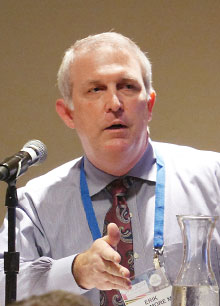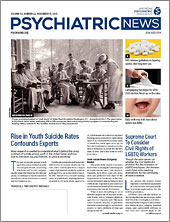Inquiring about cannabis use is critical when treating patients with first-episode psychosis (FEP), as such use is associated with a higher risk of schizophrenia and earlier onset of the disorder.
Yet these patients may be resistant to ceasing cannabis use. To overcome this resistance, mental health professionals must work together to inform patients about the risks associated with cannabis use and offer strategies to help young people “become ready” to quit.
Three researchers and therapists at APA’s Early Psychosis Pre-Conference in New York last month outlined psychosis-related risks associated with cannabis use and strategies that coordinated specialty care (CSC) teams can use to help FEP patients to stop using cannabis. The preconference was held in conjunction with APA’s IPS: The Mental Health Services Conference.
“CSC can improve individuals’ lives in a broad range of areas, such as interpersonal relationships, work, school, and symptoms of depression and psychosis, even when substance use continues to be a problem,” said Susan Gingrich, M.S.W., training coordinator with NAVIGATE, the model first-episode coordinated specialty care program developed with support from the National Institute of Mental Health. The program has been implemented at 20 sites throughout the United States. NAVIGATE was the intervention model used in the Recovery After Initial Schizophrenia Episode (RAISE) study, which helped to establish the effectiveness of coordinated specialty care for patients with FEP.
“The overall aim of the CSC program is helping people achieve goals and improve the quality of their lives,” Gingrich said. “This does not absolutely require the person to stop using substances—although it is preferable if they do. … We need to continue to work on improving functioning and goal achievement even if the individuals are not ready to change their cannabis use.”
She was joined by Erik Messamore, M.D., Ph.D., medical director of the Best Practices for Schizophrenia Treatment Center at Northeast Ohio Medical University, and Melanie Bennett, Ph.D., of the Maryland Early Intervention Center.
Motivational interviewing and enhancement—a counseling approach that aims to help people overcome their resistance to making changes—has been successfully employed to reduce cannabis use by patients with FEP, said Bennett, a training coordinator at Maryland Early Intervention Center.
Bennett said at the start of treatment for first-episode psychosis, mental health professionals can couple motivational interviewing with educational materials to begin a conversation about stopping or diminishing use of cannabis as the goal. For instance, the mental health professional might say the following: “In our work in this program, we have learned that not using cannabis is the best way for you to reduce your symptoms, achieve your goals, and feel good now and in the future. Different people do this in different ways and on different timelines. … There are many strategies to help you stop using and feel OK when you’re ready to stop. There are many things we can do to help you prepare to stop using if you’re not ready quite yet.”
As treatment continues, mental health professionals should regularly check in with the patient about his or her willingness to quit with such questions as the following: “The last time we talked, you were thinking that maybe you would cut down during the week. How are you thinking about this these days?”
Bennett said motivational interviewing and enhancement can be coupled with cognitive-behavioral therapy to help patients prepare to change, even when they still may be reluctant to give up cannabis use. Working with patients to identify challenges that may arise when reducing or stopping cannabis use and discussing how best to cope with such challenges without turning to cannabis can help better prepare patients for the future.
Said Bennett, “As our clients move toward wanting to change, we can help by preparing them to change.” ■


